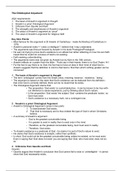Study guide
Philosophy - The Ontological Argument
Beoordeling
Verkocht
-
Pagina's
4
Geupload op
05-06-2019
Geschreven in
2018/2019
AQA Religious Studies - Philosophy - The Ontological Argument - Euthanasia - Full in depth notes according to the specification, including quotes, key thinkers and everything needed to achieve an A*.
Instelling
Vak
Oeps, er gaat iets mis.
We kunnen het document op dit moment online niet weergeven. Probeer het bestand te downloaden of neem contact op met de klantenservice.
Geschreven voor
- Study Level
- A/AS Level
- Publisher
- AQA
- Subject
- Religious Studies
- Course
- AS Units 1 and 2 - Introduction to Religious Studies
Alle documenten voor dit vak (61)
Document informatie
- Geupload op
- June 5, 2019
- Aantal pagina's
- 4
- Geschreven in
- 2018/2019
- Type
- Study guide
Onderwerpen
-
religious studies
-
aqa
-
a level
€3.59
Krijg toegang tot het volledige document:
100% tevredenheidsgarantie
Direct beschikbaar na betaling
Zowel online als in PDF
Je zit nergens aan vast
Maak kennis met de verkoper
Tagetes_Cirrhitichthys.fasciatus
Ook beschikbaar in voordeelbundel

Voordeelbundel
Religious Studies AQA A Level - Philosophy Notes for Exam
8
2019
€ 57.57
Meer info

